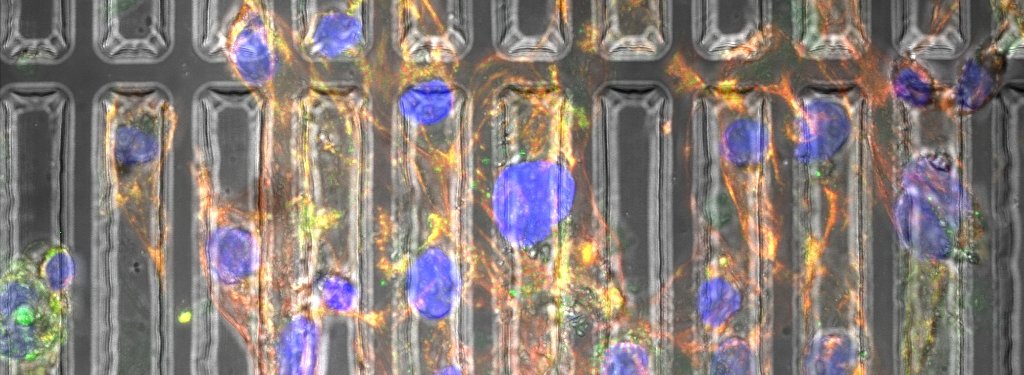At first, Mario Calabria thought it was a joke. The whole family was mountain biking on the Tech Trails, riding slowly on a flat part of the trail, when his father suddenly fell off his bike, hitting a tree as he slumped to the ground.
Mark Calabria was a fit 56 and an active outdoorsman. “I thought he was messing with us, pretending to be someone who didn’t know how to ride a bike,” Mario recalls.
Then the fourth-year mechanical engineering student at Michigan Technological University noticed that his father’s eyes had rolled back into his head.
As his younger sisters screamed, Mario transformed into something he had spent 224 hours training to become: an emergency medical technician. Within 30 seconds, he had his brother’s girlfriend calling 911; he found a map posted on a tree and identified exactly where on the Trails they were; he called Travis Pierce, assistant director of the Michigan Tech Emergency Medical Services (as well as Mario’s mentor and friend). Within two minutes, he had checked his father’s pulse, found that he didn’t have one, flipped him over and started cardiopulmonary resuscitation (CPR).
Stay With Me, Pops
As he compressed his father’s chest, he kept saying, “I love you, Pops. Stay with me.”
After about three minutes of CPR, Mark Calabria started breathing. “We got him back; we got him back,” Mario exclaimed to his mother, Marie, who had been helping her husband try to breathe.
But he’d spoken too soon. With a deep gasp, Mark stopped breathing.
Meanwhile, 911 dispatch had put out a call to Tech EMS. Pierce picked up three team members he saw as he was racing toward the Tech Trails, and two other teams headed for the scene as well. Within 11 minutes of the 911 call, six EMTs from Tech EMS and Michigan Tech police officers were at the head of the Homestead Loop of the Nara Tech Trails, a hilly, muddy section that was extremely difficult to reach.
CPR, AED, Intubation
Ross Michaels, a Tech student, EMS lieutenant and one of Mario’s best friends, took over CPR as EMS Director Jon Stone prepared an automated external defibrillator (AED), used to shock a heart back into a regular rhythm.
The emergency medical technicians soon realized that they were facing another life-threatening problem. Mark’s windpipe was starting to swell. He needed to be intubated, so any further swelling would not close his airway.
EMT training includes inserting a tube down a person’s throat. Michaels had practiced it in class, but this was his first live patient. “His first intubation ever, and he nailed it,” Mario recalls.
Stone ordered everyone to stand clear and used the AED to shock Mark’s heart. Eleven minutes had passed since Mark’s attack.
It took five tries, but finally his heart regained a steady beat.
Mercy Ambulance had arrived by then. Mario stepped back and let his teammates and Mercy paramedic Jesse Caron and EMT Jason Lunde take over. It had been 17 minutes since his father fell to the ground. “I was fried,” says Mario. “And I knew he was getting the very best care possible. I needed to take care of the rest of my family.”
Mario’s brother Rory, who had grabbed their sobbing little sisters and dashed off into the woods with them, returned, shaken. “I’m scared. I’m so scared,” he told Mario. Rory, 20, is a varsity tennis player at the University of Wisconsin-Whitewater. “Your tennis team is good because they practice, right?” Mario asked his brother. He nodded to the EMS crew, hard at work all around them. “This is my team. This is what we practice.”
There is a saying in the Calabria family: “Panic is not an option.” It’s virtually a family mantra. But it can be hard to live by at times like this.
“At first, it was just me versus a massive heart attack,” Mario says. “Then I was surrounded with people who knew what they were doing: Tech EMS, Tech police, Mercy. It was a team effort. Every person there played a pivotal role.”

Michigan Tech Police Sergeant Gary Maki noticed Mario’s younger sisters, Rosie, 8, and Sophia, 11, watching with tear-streaked faces. “Who are you girls?” he asked gently. “That’s our dad,” they replied. Maki knelt down and gave them a reassuring hug.
With Mark Calabria breathing on his own, the EMS and Mercy techs loaded him into an ambulance and negotiated their muddy, hilly way back to the highway to transport their patient to UP Health System-Portage. Thirty-four minutes had passed since Mark Calabria’s heart attack.
From Portage, he was airlifted to Marquette, where he was put into an induced coma, and a permanent defibrillator was implanted. After six days, recovering well, Mark Calabria went home to Plymouth, Minnesota, just outside Minneapolis.
Medical Mystery, Medical Miracle
Mark, an engineer and an airline pilot, had been grounded by a stroke just two and a half months before his heart attack. His doctors were as puzzled by the stroke as they are about his heart attack. A battery of medical tests has been run, including imaging of his arteries, “and they found zero plaque,” he says. “That’s unusual. Most men my age will have developed some plaque, even if they lead a very healthy lifestyle.”
One thing the doctors agree on, Mark goes on to say. “They can’t figure out why I am alive and cogent.”
Michigan Tech EMS was formed in 2010 to provide high quality emergency medical services to students, faculty, staff and visitors. They also offer American Heart Association HeartSaver CPR/AED training on campus. Michigan Tech EMS currently has 33 certified volunteers, including 28 students, four staff and one faculty member.
When Mario joined Tech EMS, he was thinking about going to medical school. “I’d love being a physician,” he says. “But getting ready for medical school meant grinding, grinding, grinding.”
“I was sacrificing quality of life today for later,” he explains. “My dad’s heart attack made me realize that there isn’t necessarily a later. It’s about the journey, not the destination.”
Now he’s heading in a different direction: teaching, which he loves.
A Team Effort
Mario insists that he is not the hero of this story. “My EMS team, the Michigan Tech police, the Mercy EMT and paramedic, they are the stars of the show.”
Mark Calabria begs to differ. “The entire team and my family played important roles, but Mario saved my life.”
Michigan Technological University is an R1 public research university founded in 1885 in Houghton, and is home to nearly 7,500 students from more than 60 countries around the world. Consistently ranked among the best universities in the country for return on investment, Michigan's flagship technological university offers more than 185 undergraduate and graduate degree programs in science and technology, engineering, computing, forestry, business, health professions, humanities, mathematics, social sciences, and the arts. The rural campus is situated just miles from Lake Superior in Michigan's Upper Peninsula, offering year-round opportunities for outdoor adventure.






Comments